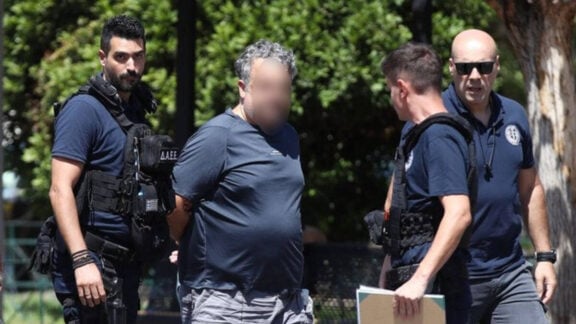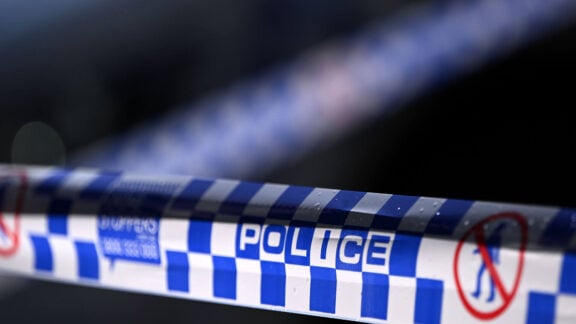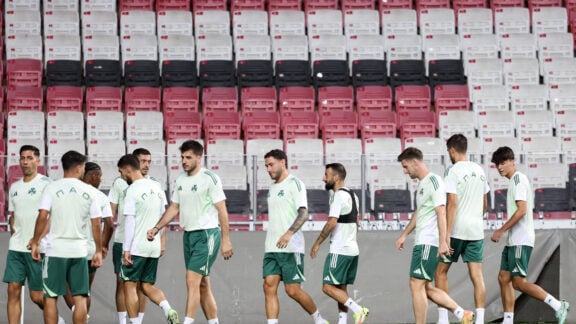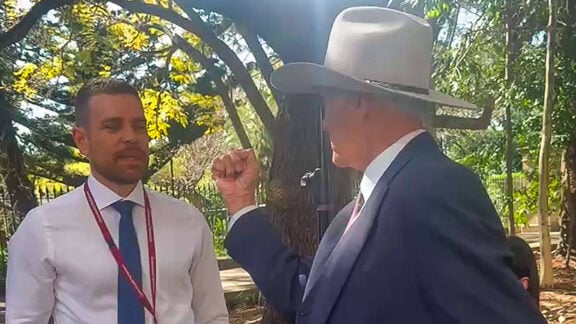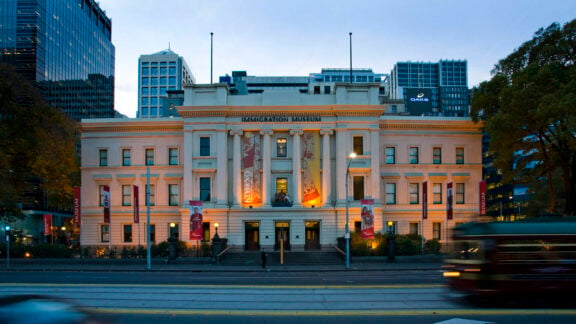The Turkish-Cypriot authorities responsible for the incidents in Pyla village within the Buffer Zone in Cyprus have received international condemnation, in which three members of the United Nations Peacekeeping Force (“blue helmets”) were injured.
The UN Secretary-General, the European Union, the United States, the United Kingdom, among others, and of course the Republic of Cyprus and Greece, placed the responsibility for the event on the authorities of the pseudo-state, who with the support of Turkish officials, “responded” that the UN is to blame for its “unacceptable” stance.
Specifically, the incidents took place on Friday (late afternoon Eastern Australian Time) within “Sector 4” in the Buffer Zone, which is under the control of the Slovak military contingent of the United Nations Peacekeeping Force in Cyprus (UNFICYP), and had been reinforced by British members of the Peacekeeping Force, as reported by Reuters.
The UN Peacekeeping Force according to UNFICYP, attempted to obstruct the “unauthorised” work of the Turkish-Cypriot side for the construction of a road between Arsos and Pyla, within the UN-mandated area that guards the Buffer Zone.
Tensions escalated, with the Turkish-Cypriots, as seen in videos posted online, attacking members of the Peacekeeping Force. Moreover, bulldozers pushed UN Mission vehicles, concrete blocks, and barbed wire fences.
An eyewitness reported that men in military and police uniforms of the pseudo-state were involved in the incidents.
A spokesperson for UNFICYP stated that three “Blue Helmets” were seriously injured and required medical treatment.
“One of them received kicks while on the ground,” said Mr Aleem Siddique.
The Turkish-Cypriot authorities “responded” by claiming that the road project serves a “humanitarian purpose” and aims to facilitate “access to the territory of the ‘TRNC’ for our citizens living in the village of Pyla”.
The “Turkish Republic of Northern Cyprus,” is a self-declared entity recognised only by Ankara.
They further asserted that it was the “Blue Helmets” who “physically attacked our groups involved in road construction and our Police, which is present in the area solely to provide security. This stance exhibited by UNFICYP is unacceptable.”
Pyla is located at the eastern end of the Buffer Zone – Green Line.
The Turkish-Cypriot authorities, as reported by Reuters, aim to construct an 11.5-kilometre road between Arsos and Pyla.
However, the UN has expressed concerns about this move, which disrupts the status quo of the area.
UNFICYP had engaged in discussions with the Turkish-Cypriot authorities regarding their plans, but the works began without the required agreement, said spokesperson Mr Siddique, despite warnings not to proceed with “unauthorised construction activities within the Dead Zone.”
“UNFICYP condemns the attacks… and damages to UN vehicles by personnel from the Turkish-Cypriot side,” the relevant statement stressed.
“The threats to the safety of UNFICYP and the damage to UN property are unacceptable and constitute a serious crime under International Law, which will be pursued to the fullest extent through the application of the law.”
UNFICYP also called on the Turkish-Cypriot side “to respect the Mission’s mandate… to refrain from any actions that could further escalate tensions and to immediately withdraw all personnel and machinery from the UN Dead Zone.”
https://www.facebook.com/watch/?v=838119257671967
Simos Mytides, President of the Pyla Community Council, told CNA that apart from the Buffer Zone, on the side of the occupied Arsos, the works were ongoing.
He further stated that about a month ago, the occupying authorities had placed flags of the pseudo-state within the Buffer Zone, which constitutes a violation of the status quo.
Mr Mytides said that “with the opening of this particular road, the Turks have direct access from the occupied areas to the Turkish enclave north of Pyla, and by doing so, they avoid passing through the Pergamos checkpoint, which is within the limits of the British Bases, and they won’t undergo any checks.”
“In an area already dealing with problems of smuggling, migrants…”
THE TURKISH-CYPRIOT SIDE
The so-called Ministry of Foreign Affairs of the pseudo-state had announced that the contentious road project would proceed “for humanitarian and economic reasons”.
The pseudo-state even accuses the Greek-Cypriot side of a long-standing lack of goodwill on the matter and the UNFICYP of indifference to continuous violations of the Buffer Zone in the area by the Greek-Cypriots.
Ersin Tatar, the leader of the Turkish-Cypriot community, commenting on the incidents, told Reuters that it is “unfortunate that an attempt was made by UNFICYP to obstruct the development of the road being executed by a civilian contractor within the sovereign territory of the ‘TRNC’.”
https://www.facebook.com/watch/?v=817438533095106
TURKEY
Omer Celik, the spokesperson for Turkey’s ruling party (AKP), also criticized UNFICYP members for hindering the expansion of the road.
“The stance of the UN Peacekeeping Force that serves in Cyprus… was unacceptable and extremely misguided,” he wrote on Twitter (which has been renamed as “X”).
He noted that the stance aimed to “satisfy the Greek-Cypriot side and has damaged” the reputation of UNFICYP.
He stated that “the Peacekeeping Force approved the construction of the Larnaca-Dhekelia-Ayia Napa and Pyla-Boroklini roads, which were constructed by Greek-Cypriots through the appropriation of Turkish-Cypriot lands. Therefore, the stance… towards the Turkish-Cypriot side now carries a double standard and has dealt a heavy blow to its impartiality.”
“Just as our president (Recep Tayyip Erdogan) has clearly and unambiguously stated on UN platforms, everyone must fully respect the fact that there are two equal sovereign peoples in Cyprus.”
Fuat Oktay, the president of the Committee on Foreign Affairs of the Grand National Assembly of Turkey, called on UN officials “to change their stance, which is already problematic, and engage in direct dialogue with the ‘Turkish Republic of Northern Cyprus’.”
Regarding the developments, diplomatic adviser to Erdogan, Akif Cagatay Kilic, spoke on CNN Turk.
“It was a major mistake for the Greek-Cypriots to become members of the EU, representing the entire island… unfortunately, the EU’s uniform approach in other matters related to foreign policy, i.e., supporting and showing solidarity with an EU member state, leads to certain negative developments.”
“Because, with regret, I say that the ‘Greek-Cypriot Administration of Southern Cyprus’ abuses this solidarity in certain instances… At this point, we express that we are determined to protect the rights of the Turkish-Cypriot people arising from International Law and particularly their acquired rights.”
In terms of the works in Pyla, he said that “the Greek-Cypriot side says it’s a ‘military plan.’ We say, ‘No, it’s a humanitarian project’… Regarding this, there has already been communication with the UN. It has been stated that progress will be made concerning this.”
INTERNATIONAL CONDEMNATION
The condemnation for the attack on UNFICYP members was international.
The Cypriot government condemned the incidents and the unacceptable attack against British and Slovak members of the UN Peacekeeping Force.
“The threats against the security of UN peacekeepers are condemnable and constitute a serious crime under international law… The government is taking all diplomatic actions and is in constant contact with the United Nations, Permanent Members of the Security Council, the European Union, the Greek Government, and the leadership of the UN Peacekeeping Force in Cyprus to prevent Turkish plans,” stated the government spokesperson, Constantinos Petrides, in a written statement.
Greece’s Prime Minister Kyriakos Mitsotakis, had a telephone conversation with the President of the Republic of Cyprus, Nicos Anastasiades.
According to the Greek government, the Prime Minister expressed strong disapproval for the unacceptable attacks by Turkish Cypriots against UNFICYP members and affirmed that Greece and Cyprus are fully coordinated to take the necessary actions at the international level.
The Greek Ministry of Foreign Affairs also condemned the incidents in its statement, noting among other things, that “the attempt to create fait accompli within the Buffer Zone constitutes a blatant violation of the status quo, while the attack on UN Peacekeeping Force members represents an act of disregard for international legitimacy.”
“Illegal activities must cease immediately, and any activity that would escalate tensions must be avoided,” the Ministry of Foreign Affairs noted and added: “Such actions do not contribute at all to the UN’s efforts to revive negotiations for the resolution of the Cyprus issue.”
The Secretary-General of the United Nations, Antonio Guterres, also condemned the events, characterising the attack against UN peacekeepers as “unacceptable,” which “might constitute a serious crime under international law.”
The blue helmets “were impeding unauthorised construction activity in the area, as mandated,” the relevant statement highlighted.
Mr Guterres called on the Turkish Cypriot side to “respect” the authority of UNFICYP and to “immediately withdraw” its personnel and equipment “from the buffer zone.”
The top officials of the EU also issued a collective condemnation.
Furthermore, the US, the UK, and France, three of the five permanent members of the UN Security Council, condemned the incident.
“These actions are entirely unacceptable and undermine the ability of the UN to fulfil its peacekeeping mandate,” their embassies stated in a joint announcement.
The embassy of the People’s Republic of China (also a permanent member of the UN Security Council) in Cyprus also condemned the attack, stressing that “the integrity and inviolability of the Buffer Zone must be respected. Unauthorised construction should stop. Unauthorised military or political activities within and along the ceasefire lines should be prevented.”
It expressed hope that Greek Cypriots and Turkish Cypriots “will firmly hold onto the ‘golden key’ of dialogue and consultation, increase mutual trust through dialogue, promote reconciliation through cooperation, and find maximum common ground.”
However, according to Hellas Journal, Russia (the 5th permanent member of the UN) thwarted the issuance of a joint statement by the UN Security Council condemning the attack.
It should be noted that recently, the Russian state news agency TASS reported that the Russian Embassy in Cyprus will soon begin providing consular services “in the northern part of the island.”
The Ministry of Foreign Affairs of Cyprus issued a statement, noting that it “was and is consulting with the Russian Federation regarding the issue of possible Russian presence in the occupied areas to provide consular assistance to find ways to address this issue in a manner consistent with the principles of international legitimacy and the relevant resolutions of the UN Security Council.”
Ersin Tatar welcomed Russia’s new move in the occupied areas, referring to it as an important humanitarian and diplomatic step.
He stated that “the new development proves the effectiveness of diplomacy focused on mutual interests.”
The Russian Embassy in Cyprus clarified that the issue of consular protection and physical care of Russians living in the occupied areas is purely administrative and technical in nature, albeit with a strong humanitarian component, and made it clear that “it does not in any way affect Russia’s position on the settlement of the Cyprus issue”.
USA REACTS
The strong condemnation of the attack on Pyla was also expressed by Senator Robert Menendez.
The President of the US Senate Foreign Relations Committee stated:
“The attack on UN personnel is unacceptable and criminal under International Law. The UN peacekeeping forces play a crucial role in promoting calmness and stability. Turkish Cypriot forces must immediately take responsibility and cease any further actions that escalate the situation and jeopardize not only the lives of UN peacekeeping forces but also the overall stability on the island. They must cease any unauthorized construction in the area aimed at undermining the peacekeeping mission and the agreed Dead Zone. These provocative actions only serve to promote instability and violence. I also strongly urge the UN Secretary-General to appoint an envoy who will assist in revitalizing negotiations for a long-term settlement.”
Additionally, strong condemnation came from members of the Hellenic Caucus in the US House of Representatives.
The relevant statement is signed by Greek-American Representatives Gus Bilirakis, Chris Pappas, Nicole Malliotakis, and Dina Titus among others, highlighting:
“… 49 years after Turkey’s illegal invasion and occupation of Cyprus, the unjustified and illegal Turkish occupation regime continues to escalate tensions and destabilize the entire Eastern Mediterranean region. We will continue our efforts to seek justice for Cyprus and demand the immediate withdrawal of Turkish troops, the return of property to its rightful owners, and the reunification of Cyprus.’
Furthermore, a travel advisory for American citizens to avoid traveling to the occupied areas was issued by the US Embassy in Nicosia.
“Due to the escalation of events in the Pyla area, the US Embassy in Nicosia strongly encourages US citizens to reconsider any plans to travel to the occupied areas this weekend or until the situation de-escalates.”
As a result, American citizens are especially advised to stay away from the Pyla region.
EXPANSION OF ARMS EMBARGO LIFT
Meanwhile, in another development concerning Cyprus, the Ministry of Foreign Affairs of the Republic of Cyprus expressed its satisfaction with the decision of the US Department of State to extend the lifting of the arms embargo against Cyprus.
“The Republic of Cyprus welcomes the reaffirmation of this decision and its extension for the fiscal year 2024, based on the ‘Eastern Mediterranean Security and Energy Partnership Act’ legislation established by the US Congress in 2019.
The decision of the US Government highlights the ongoing enhancement of bilateral Cyprus-US relations in the security and defense sector. Our goal remains the deepening of this strategic partnership cooperation based on international law and the need to build conditions of security and stability in the Eastern Mediterranean region.”

